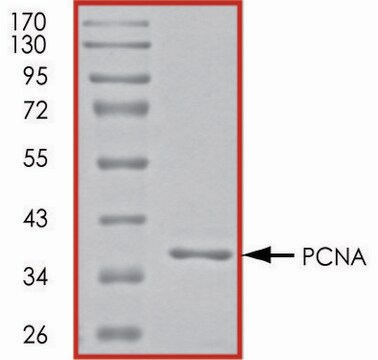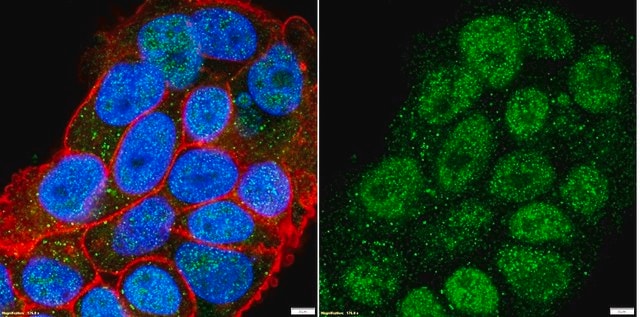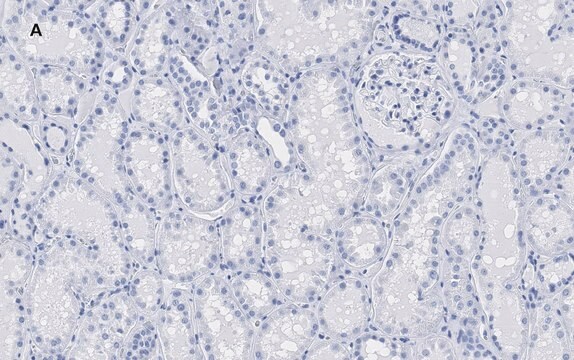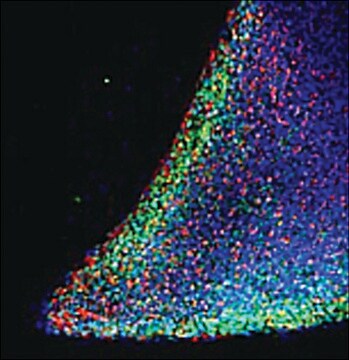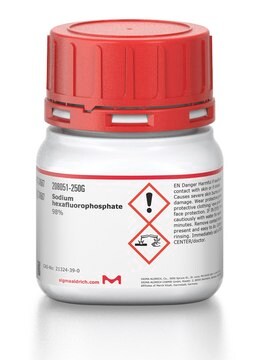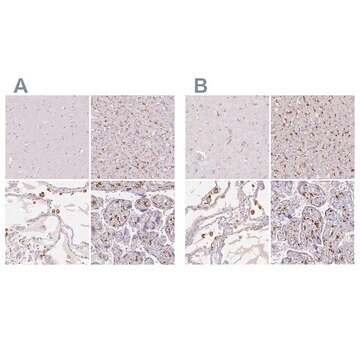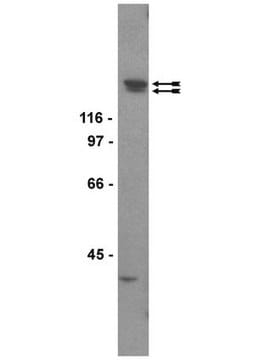おすすめの製品
由来生物
human
リコンビナント
expressed in E. coli
アッセイ
≥98% (HPLC)
≥98% (SDS-PAGE)
フォーム
lyophilized
分子量
34.5 kDa
包装
pkg of 20 μg
テクニック
cell culture | mammalian: suitable
不純物
<0.1 EU/μg endotoxin, tested
色
white to off-white
UniProtアクセッション番号
輸送温度
wet ice
保管温度
−20°C
遺伝子情報
human ... NANOG(79923)
詳細
NANOG gene is localized to human chromosome 12p13.31 and has multiple pseudogenes. This gene is composed of four exons, three introns, and a 915bp open reading frame (ORF). The encoded protein was first discovered in ESCs (embryonic stem cells) and is a divergent homeobox domain protein. NANOG protein is composed of 305 amino acids and a central homeodomain (HD). This HD is composed of an unstructured N-terminal arm, a bundle of three α-helices (H1–H3) interlinked by loops.
Recombinant human Nanog is a 34.7kDa protein, which is synthesized as a 304 amino acid polypeptide lacking a signal sequence for secretion.
Recombinant human Nanog is a 34.7kDa protein, which is synthesized as a 304 amino acid polypeptide lacking a signal sequence for secretion.
生物化学的/生理学的作用
NANOG is one of the central genes regulating self-renewal and pluripotency capacities of embryonic stem cells (ESC). Constitutive expression of this gene prevents the differentiation of ESCs, and along with SOX2 (SRY-box 4) and OCT-4 (octamer-binding transcription factor 4), it regulates pluripotency-related gene expression and maintains the pluripotency of ESCs. During ESC differentiation both these genes are down-regulated, and gene profiling shows that the expression of NANOG is uniformly high in ESC lines. There is significant similarity between ESC and carcinoma in situ testis (CIS), including the high expression of NANOG. It is novel marker for testicular CIS and germ cell tumors. NANOG shows abnormal expression in a variety of human cancers, such as carcinomas of the brain, oral cavity, head and neck, breast, lung, liver, pancreas, kidney, gastric, cervix, ovary, prostate, and colon. This expression is also related to treatment resistance and poor survival of cancer patients.
シーケンス
SVDPACPQSL PCFEASDCKE SSPMPVICGP EENYPSLQMS SAEMPHTETV SPLPSSMDLL IQDSPDSSTS PKGKQPTSAE NSVAKKEDKV PVKKQKTRTV FSSTQLCVLN DRFQRQKYLS LQQMQELSNI LNLSYKQVKT WFQNQRMKSK RWQKNNWPKN SNGVTQKASA PTYPSLYSSY HQGCLVNPTG NLPMWSNQTW NNSTWSNQTQ NIQSWSNHSW NTQTWCTQSW NNQAWNSPFY NCGEESLQSC MQFQPNSPAS DLEAALEAAG EGLNVIQQTT RYFSTPQTMD LFLNYSMNMQ PEDV
物理的形状
凍結乾燥品(10 mM酢酸)
再構成
バイアルは、開封前に遠心してください。水で濃度0.1~1.0 mg/mLに復元してください。ボルテックスは行なわないでください。水溶液は2~8°Cで最長1週間保存できます。長期保存には、担体タンパク質(0.1% BSAなど)含有バッファーでさらに希釈し、1回の使用量ずつに分注して-20~-80°Cで保存することを推奨します。
シグナルワード
Warning
危険有害性情報
危険有害性の分類
Eye Irrit. 2 - Skin Irrit. 2
保管分類コード
11 - Combustible Solids
WGK
WGK 3
引火点(°F)
Not applicable
引火点(℃)
Not applicable
適用法令
試験研究用途を考慮した関連法令を主に挙げております。化学物質以外については、一部の情報のみ提供しています。 製品を安全かつ合法的に使用することは、使用者の義務です。最新情報により修正される場合があります。WEBの反映には時間を要することがあるため、適宜SDSをご参照ください。
労働安全衛生法名称等を表示すべき危険物及び有害物
名称等を表示すべき危険物及び有害物
労働安全衛生法名称等を通知すべき危険物及び有害物
名称等を通知すべき危険物及び有害物
Jan Code
SRP3119-20UG:
最新バージョンのいずれかを選択してください:
Stem cell pluripotency factor NANOG is expressed in human fetal gonocytes, testicular carcinoma in situ and germ cell tumours.
Hoei-Hansen CE et al
Histopathology, 47(1), 48-56 (2005)
Structure-based discovery of NANOG variant with enhanced properties to promote self-renewal and reprogramming of pluripotent stem cells.
Hayashi Y
Proceedings of the National Academy of Sciences of the USA, 112(15), 4666-4671 (2015)
Shuai Gong et al.
Molecular carcinogenesis, 54(9), 679-687 (2015-05-28)
As one of the key pluripotency transcription factors, NANOG plays a critical role in maintaining the self-renewal and pluripotency in normal embryonic stem cells. Recent data indicate that NANOG is expressed in a variety of cancers and its expression correlates
Adam H Hart et al.
Developmental dynamics : an official publication of the American Association of Anatomists, 230(1), 187-198 (2004-04-27)
The murine Nanog gene, a member of the homeobox family of DNA binding transcription factors, has been shown recently to maintain pluripotency of embryonic stem cells. We have used a sequence homology and expression screen to identify and clone the
Kaoru Mitsui et al.
Cell, 113(5), 631-642 (2003-06-06)
Embryonic stem (ES) cells derived from the inner cell mass (ICM) of blastocysts grow infinitely while maintaining pluripotency. Leukemia inhibitory factor (LIF) can maintain self-renewal of mouse ES cells through activation of Stat3. However, LIF/Stat3 is dispensable for maintenance of
ライフサイエンス、有機合成、材料科学、クロマトグラフィー、分析など、あらゆる分野の研究に経験のあるメンバーがおります。.
製品に関するお問い合わせはこちら(テクニカルサービス)